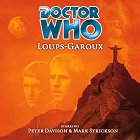 The TARDIS brings the Doctor and Turlough to Rio de Janeiro in the year 2080, just in time for the carnival. During the festivities, both of the time travelers become aware of another presence that seems out of place – something lurking, waiting patiently in the dark as it has done for centuries – something that will draw them both into the center of a battle for dominion over the human race.
The TARDIS brings the Doctor and Turlough to Rio de Janeiro in the year 2080, just in time for the carnival. During the festivities, both of the time travelers become aware of another presence that seems out of place – something lurking, waiting patiently in the dark as it has done for centuries – something that will draw them both into the center of a battle for dominion over the human race.
written by Marc Platt
directed by Nicholas Pegg
music by Alistair LockCast: Peter Davison (The Doctor), Mark Strickson (Turlough), Elanor Bron (Ileana De Santos), Nicky Henson (Pieter Stubbe), Sarah Gale (Rosa Caiman), Jane Burke (Inez), Burt Kwouk (Dr. Hayashi), David Hankinson (Anton Lichtfuss), Derek Wright (Jorge)
Timeline: between Phantasmagoria and Singularity
LogBook entry and TheatEar review by Earl Green
Review: A very atypical Doctor Who story, Loups-Garoux almost feels like an attempt to graft a McCoy-era New Adventures novel into the Peter Davison era. Davison and Mark Strickson are at the top of their form, and Elenor Bron brings a lot of class to a role that could’ve come across as being very silly. Sadly, there’s a lot of audio overmodulation in scenes with raised voices, and fuzzy audio doesn’t help something which is occasionally a fuzzy plot. Perhaps the point at which it all derails for me (no pun intended, as a lot of Loups-Garoux takes place on a train) is when the Doctor tries to stop the fractious herd of werewolves from fighting over the fate of humankind by pledging his protection – and, potentially, his hand in marriage – to werewolf matriarch Ileana de Santos (Bron). This, coupled with his later confusion about “women not being his strong point,” takes the whole story off on a massive detour, and it all seems to resolve with some very odd metaphysical imagery that becomes a bit confusing in an audio format.
A nice attempt – and I admit that, the whole Doctor-as-suitor subplot aside, I did like the implication that Turlough was getting a little action during these events – but it went a bit too far. Hopefully Platt’s next entry, 2002’s Spare Parts, will veer a little closer to some of the constraints of telling a story with sound.
